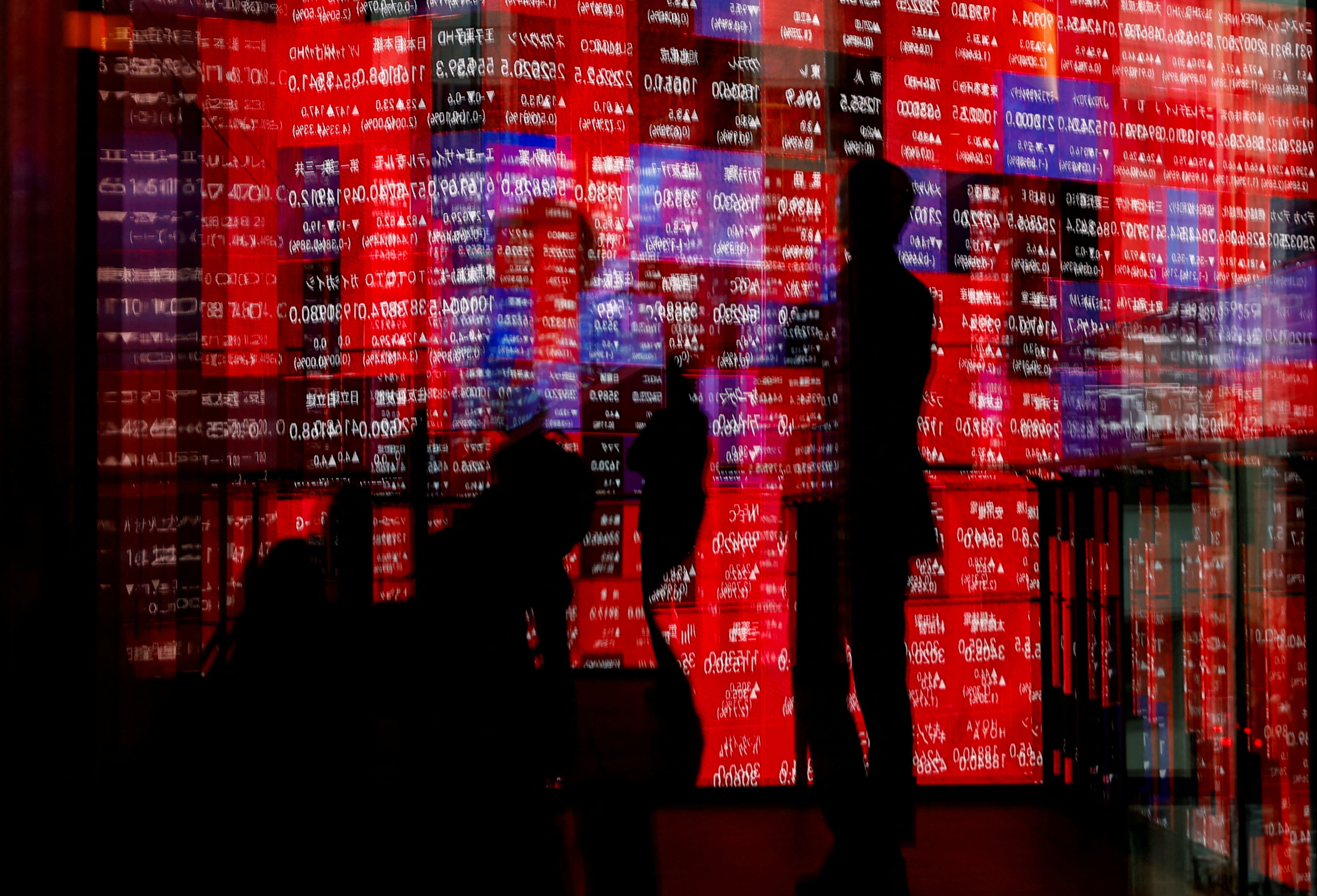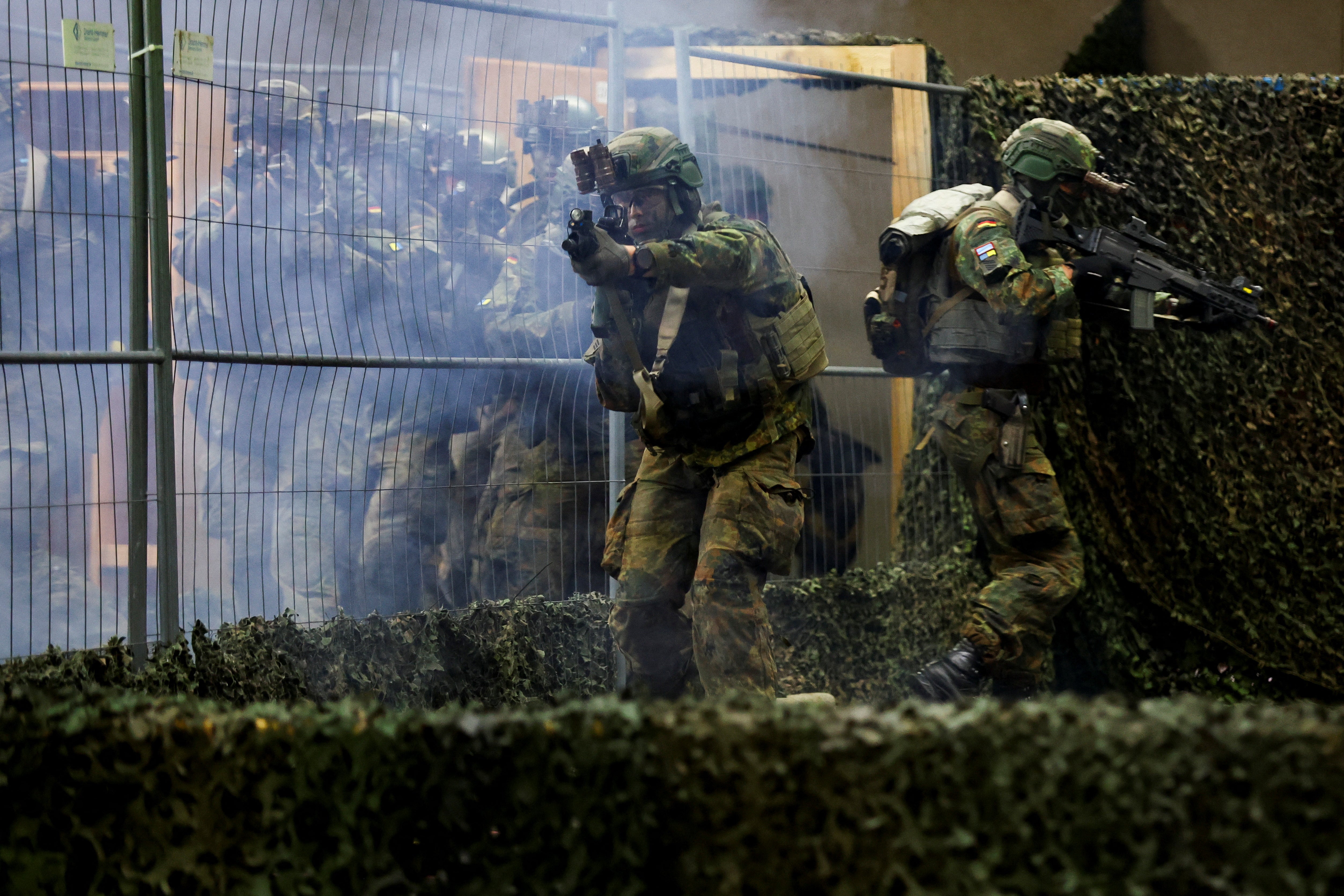
Global stocks, and yields, nosedive as US tariffs fan trade war fears
PHOTO CAPTION: Illustrative photo (REUTERS/Issei Kato)
(Reuters) -World markets were left reeling on Thursday after U.S. President Donald Trump unveiled reciprocal tariffs to match duties put on U.S. goods by other countries.
Stock markets tumbled and investors dashed to the relative safety of bonds, gold and the yen. The S&P 500 and Dow dropped about 4%, while the tech-heavy Nasdaq was down more than 5%.
U.S. Treasury yields slid, China's yuan dropped to a seven-week low, and the dollar came under heavy selling pressure.
Click here for a factbox on reciprocal tariffs.
COMMENTS:
SAM STOVALL, CHIEF INVESTMENT STRATEGIST, CFRA RESEARCH, PENNSYLVANIA
"The tariff announcement was much more dire than expected and as a result stocks are in a free fall which is due to the expected inflationary impact of these tariffs, as well as the pressure that would likely be pushed company profits, and we're also seeing that sector leadership is squarely in safe haven mode, with consumer staples, health care and utilities holding up the desk while consumer discretionary and tech in full retreat."
"I think that investors are opportunists and will look for such a decline as a potential reason to buy, because how frequently do you end up with a 4% decline in the S&P 500 and a 5.5% decline in the NASDAQ? So there's an old saying that stocks tend to pop after a drop, and I think that in the next couple of days, we could end up with a pop mainly because the President is a negotiator and we believe that in the end, the Trump administration will try to work with our trading partners and come down to the base case of a 10% tariff across."
MICHAEL REYNOLDS, VICE PRESIDENT OF INVESTMENT STRATEGY, GLENMEDE, PHILADELPHIA
"We're not at all surprised by the market reaction today. It's risk off. It's pretty indiscriminate. It's cross borders."
"The announcement yesterday I think was a little more aggressive than even some of the largest trade hawks would have expected."
"We're talking about a pretty significant regime change in how the U.S. approaches global trade. And when you have a regime change like this that happens suddenly, at the flip of a switch, it's going to happen in a couple days... it doesn't surprise us to see a relatively violent market reaction."
KEN MAHONEY, CEO, MAHONEY ASSET MANAGEMENT, MONTVALE, NEW JERSEY:
"It really makes no sense. The amount of ‘savings’ we are going to get as a percentage of GDP, or a percentage of the national debt, while losing trillions in market cap and possibly pushing us into a recession within a few months might be the worst trade-off in economic history. Without even looking, we know that this selloff and its velocity pushing us close to bear market territory from the highs, at least for the Nasdaq(-17.2% currently), must be just second to the velocity of the Covid selloff."
"If you are keeping score of where capital is flowing around the world it is certainly out of US markets, as we are down double digits from highs, meanwhile in China and Germany for example, they are up double digits. So someone has wrong here and someone has it right, and markets are never wrong."
"We can expect some pre-announcements this earnings season, as what guidance can a company really give in this scenario when things are looking so dire. Even before tariffs were actually set in stone, we heard from companies like Walmart and Delta for example that we remember, that they were already seeing a slowdown as the tariff talk just started so we can only imagine what they are going to say now."
"Trump, and maybe it is intentional as some believe, is boxing in the Fed. We have tariffs now, and even before that, as Powell hinted at during the last Fed day, signs of stagflation. We have seen people going crazy on Twitter/X calling for an emergency rate cut today which we think is way out of line."
DHAVAL JOSHI, CHIEF STRATEGIST, BCA RESEARCH, LONDON:
"The sell-off has been concentrated in AI stocks. The connection between the stock market sell-off and tariffs is not direct. Because if it was a direct connection, then you know, for example, retailers should be doing really badly. So what this is telling me is that this is like a sort of excuse or a catalyst for selling stocks which are really expensive. It was an expensive part of the market and it just needed a catalyst for the sell-off to start and that's what's happened. Even though there's no direct connection."
LEE HARDMAN, SENIOR CURRENCY ANALYST, MUFG, LONDON:
"From the dollar perspective, more broadly, initially we did see the dollar weaken across the board. The market initially is focusing on the negative implications for the U.S. economy more from these tariffs. It increases the risk of the U.S. slowing more and the Fed having to be more active in terms of cutting rates, despite higher inflation because of the tariffs. We would question how sustainable that sell-off in the dollar will be. If global growth is hit harder by these tariffs, then at some point we would expect the dollar to bounce back and to strengthen in that scenario."
SANDRA EBNER, SENIOR ECONOMIST, UNION INVESTMENT, FRANKFURT:
"We assume that the tariffs will not remain in place in the announced range, but will instead be a starting point for further negotiations. Trump has set a maximum demand from which the level of tariffs should decrease. However, it is already clear that the White House is targeting the EU and China in particular, while Mexico and Canada tend to be excluded from the trade barriers. In the past, many companies have emphasized that it is not so much the tariffs themselves that are a burden, but rather the uncertainty regarding U.S. trade policy."
"At least that is now off the table. Since the measures would not affect all regions and sectors equally, there will be winners and losers as in 2018 – although the losers are more likely to be in the EU than in North America. To protect companies in Europe from the effects of tariffs, the EU should not respond with high counter-tariffs. In any case, their impact in the U.S. is not likely to be significant. It would be more efficient to provide targeted support to EU companies in the form of investment and stimulus."
NICHOLAS REES, HEAD OF MACRO RESEARCH, MONEX EUROPE, LONDON:
"Today for us, it's all going to be about watching the fallout from last night's announcement."
"Specifically, I'm looking at China and the eurozone. If there's a significant retaliation from China, that will be interesting. And it'll be interesting to see whether this involves dumping, because then you'll likely see ...tariffs on China go up. And at that point, we're looking at a rise in tariff barriers, not just from the U.S. and the rest of the world, but a rise in tariff barriers across the board."
JESSICA HENRY, INVESTMENT DIRECTOR FOR EQUITIES, FEDERATED HERMES LIMITED, LONDON:
"While Trump’s tariff announcements provided European markets with some degree of clarity, a key concern is that tariff uncertainty continues with retaliatory tariffs from the EU, UK and other regions expected to unfold in the coming days, and further announcements likely to be made from the U.S.."
"Prolonged uncertainty will likely cause ripple effects through global markets, further eroding investor confidence which has dwindled of late, particularly in relation to the Magnificent Seven."
DOMINIC BUNNING, HEAD OF G10 FX STRATEGY, NOMURA, LONDON:
"I think that the negative growth shock this seems to be implying for the U.S. is going to keep weighing on the dollar as investors think about whether to continue with the U.S. exceptionalism theme."
"There have been sizable flows from Europe to the U.S. (of around 500 billion euros in the last 12 months, according to the US TIC data) which could reverse to some extent."
"Obviously we need to see whether there are more tit-for-tat tariffs and retaliation, but the overarching theme to me is that European growth expectations have been basing, while U.S. expectations have rolled over and have further to run which can weigh on the USD against G10 FX in general."
JUSTIN ONUEKWUSI, CIO, ST JAMES'S PLACE, LONDON:
"Whilst still uncertain, we will likely see retaliation from Europe but it's clear countries will think about how to retaliate in a politically astute way."
"Significant retaliation could lead to a tariff 'spiral of doom' that could be the growth shock that drags us into recession."
"Germany has its biggest fiscal expansion since reunification but exporters and industrials in particular will be challenged buy U.S. tariffs."
"Still European equities are cheap and there is more significantly more upside."
"We have raised global recession risks to 35% from 15%."
"The volatility in markets, is likely to create opportunities for investors that are willing to be patient."
FREDERIQUE CARRIER, HEAD OF INVESTMENT STRATEGY, RBC WEALTH MANAGEMENT, LONDON:
"The U.S. tariffs on the UK are less severe than those imposed on Europe, at 10%, a welcome relief to the UK government. However, the UK was not spared the 25% tariff imposed on all foreign autos, which will disappoint. The strategy to hold quiet negotiations ahead of the announcement doesn’t seem to have paid off so far."
"The tariffs serve as a stark reminder that the highly sought after free trade agreement with the US – once a key goal of the Brexit agenda – remains out of reach."
KASPER ELMGREEN, CIO OF FIXED INCOME AND EQUITIES, NORDEA ASSET MANAGEMENT, COPENHAGEN:
"These tariffs are worse than expected, as shown by equities trading significantly down and gold and bonds trading up. Clearly, the reading here is that the recession risk is on the rise. This is a very clear signal, if anyone should be uncertain that globalisation has reversed, this is the signifier. We were in a period of high policy uncertainty, this is also why the initial excitement after the election abated so much. This announcement does not reduce uncertainty, but it is just step one in a process. We should expect now to see countermeasures and retaliations."
"One potential positive outcome is this is a shock to the system and it stabilises, this is a negotiation, a tactic to reset what is seen as an unfair system. That could create some kind of certainty. The negative view is that this does not create any certainty and there is a prolonged period of negotiations, hitting growth."
MAARTJE WIJFFELAARS, SENIOR ECONOMIST AT RABOBANK, EINDHOVEN:
"The tariffs on EU goods soften EU growth and raises EU inflation somewhat, but won’t to push the EU in a recession.
What is important for the EU outlook is what will happen due to the broadscale tariffs with overall US demand, global demand and supply chains, how the EU will respond, and obviously investment decisions.
The latter are likely to be delayed due to the uncertainty, but the extent to which is impossible to predict. We know from previous crises episodes that investments can shrink quickly – and the same goes for recovery by the way."
LYNN SONG, CHIEF ECONOMIST FOR GREATER CHINA, ING, HONG KONG:
"The tariff hike was larger than what most market participants were expecting, so the initial market is likely going to be a continuation of risk off sentiment, reflecting weaker growth expectations on a macro level as well as the individually impacted companies on a micro level.
"However, lost in the initial panic are several key things to consider. First, the U.S. has signalled that these reciprocal tariffs will mark a cap unless countries choose to retaliate, and they appear to be encouraging countries to come and negotiate to lower the rates. Second, a broad based global tariff means that substitution products are less available.
"It feels like this time around US importers could end up bearing more of the burden from tariffs rather than expecting exporters to make up for the gap by cutting margins."
RODRIGO CATRIL, SENIOR CURRENCY STRATEGIST, NATIONAL AUSTRALIA BANK, SYDNEY:
"When you look at the tariff announcement, it's certainly bigger and larger than the base case for many, or most, so it's not surprising to see how the kiwi and the Aussie are the ones underperforming today, reflecting their pro-growth sensitivity, and of course an increase in tariffs does mean lower trade and lower global growth.
"For the euro, it's an interesting one in the sense that it's showing some resilience, and that's probably related to the fact that Europe appears to be more focused on supporting its economy from the impact from U.S. tariffs, rather than looking to retaliate as a first initiative. So I think the market has liked that approach of calmness and measuredness from Europe."
WANG ZHUO, PARTNER, ZHOUZHU INVESTMENT, SHANGHAI:
"Trump's new tariff measures are undoubtedly unwise, as fair trade is not realized through so-called reciprocal taxes, but is determined by comparative advantage.
"The higher tariffs will dent U.S. efforts to reduce inflation, so it's possible the U.S. will witness stagflation. The slump in U.S. stocks is a sign that investors are voting with their feet.
"The Chinese market is fully prepared psychologically, so is resilient. What's more important for China now, is to pay attention to domestic macro policies and data, and see when our CPI data can improve and whether it's sustainable."
(Compiled by the Global Finance & Markets Breaking News team; Editing by Alden Bentley, Lincoln Feast, Dhara Ranasinghe and Amanda Cooper.)










